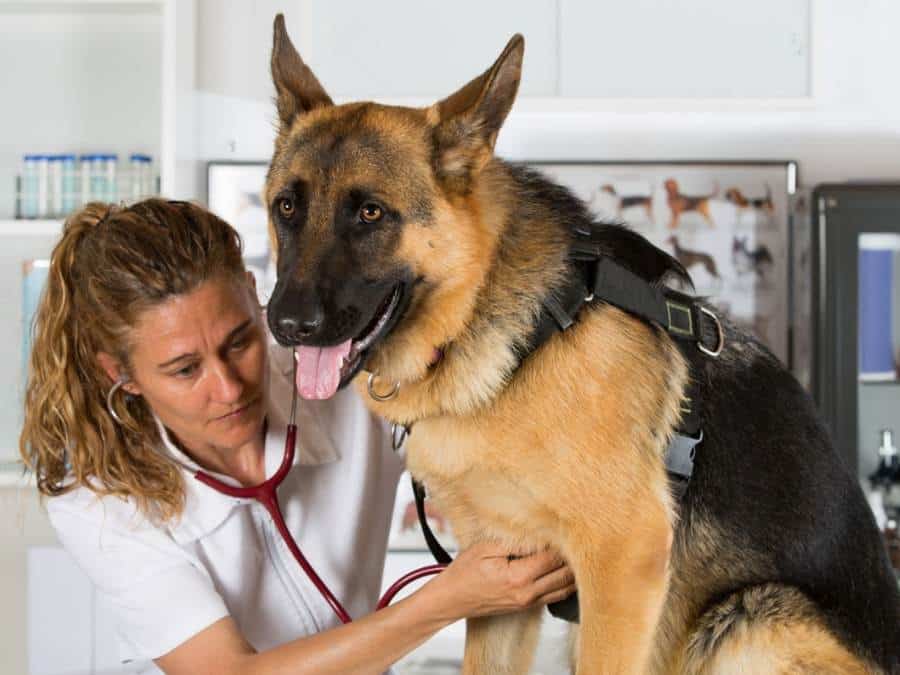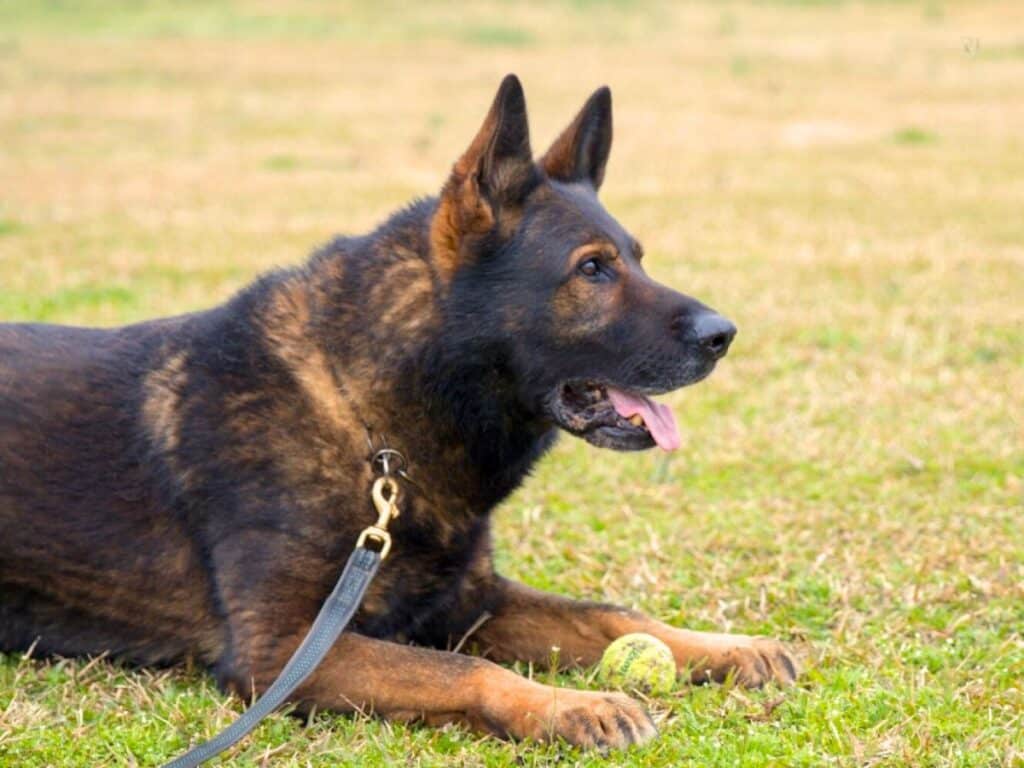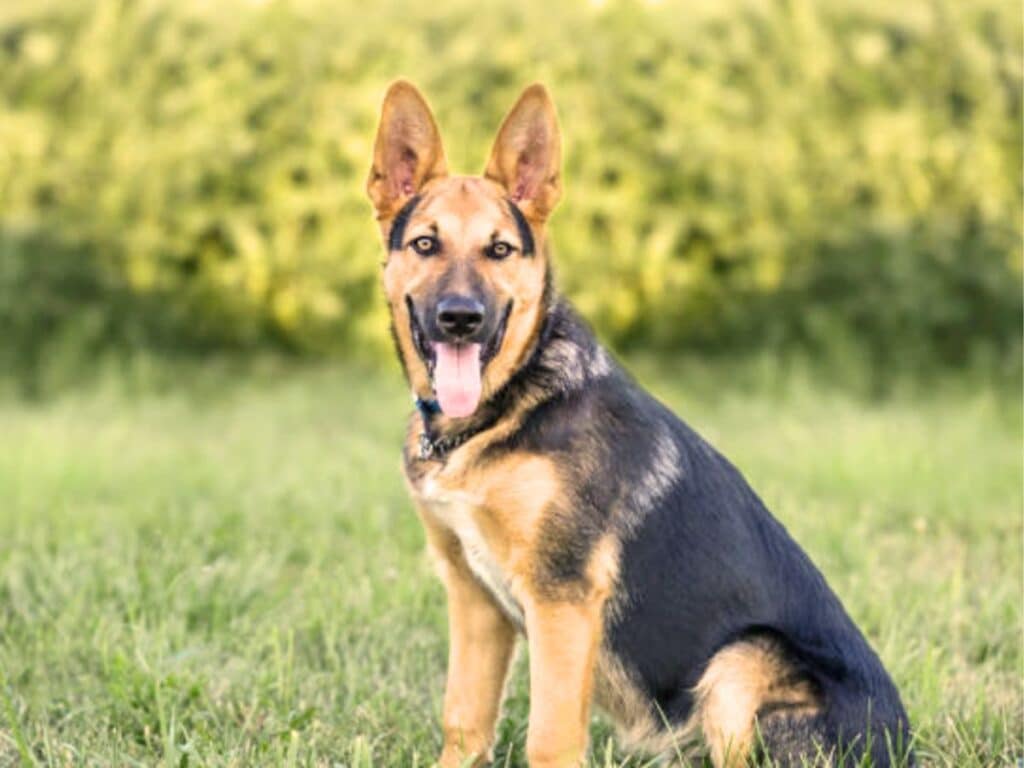I remember the day vividly when my German Shepherd, Rocky, suddenly became lethargic and started pacing restlessly. Concerned, I rushed him to the vet, only to discover that he was suffering from a life-threatening condition known as Gastric Dilatation and Volvulus (GDV), or simply bloat.
This experience made me realize just how crucial it is for every dog owner to be aware of this silent yet deadly threat.
So in today’s post, we’ll explore the factors that contribute to this condition in our beloved furry friends and discuss effective ways to prevent and manage it.
What is Gastric Dilatation Volvulus (GDV) or Bloat in Dogs?
Gastric dilatation volvulus, commonly known as GDV or “bloat,” occurs when a dog’s stomach fills with gas and becomes distended, often twisting on itself. This twisting can lead to a blockage of blood flow to the stomach and other vital organs, causing severe complications.
GDV is a life-threatening emergency that requires immediate veterinary attention. If left untreated, it can result in tissue damage, organ failure, and even death.
Recognizing the signs of bloat and seeking prompt medical intervention is crucial for the well-being of your furry friend.
Why are German Shepherds prone to bloating?
Unfortunately, German Shepherds are among the breeds that are considered at higher risk for GDV, along with other deep-chested breeds such as Great Danes, Dobermans, and Standard Poodles.
Several factors contribute to this increased susceptibility:
- Anatomy: German Shepherds have deep chests compared to other breeds. This deep-chested conformation predisposes them to GDV because there is more room for the stomach to twist or rotate.
- Genetics: There may be a genetic component involved in the development of bloat in German Shepherds. Research suggests that certain bloodlines within the breed may be more susceptible than others.
- Eating habits: German Shepherds often have an enthusiastic appetite and tend to eat quickly without chewing thoroughly. Rapid eating can lead to excessive air swallowing (aerophagia), which contributes to bloating.
Given the breed’s predisposition to bloat, it is crucial for German Shepherd owners to be proactive in preventing this condition. Here are some tips that can help reduce the risk:
- Feed smaller, more frequent meals instead of one large meal.
- Use slow-feed bowls or puzzle feeders to encourage slower eating.
- Avoid vigorous exercise immediately before or after meals.
- Monitor your dog closely for signs of discomfort, such as restlessness, pacing, unproductive retching, or a distended abdomen.
Remember, prevention is key. By being aware of the risks and taking necessary precautions, you can help keep your beloved German Shepherd safe and healthy.
Check out this article to understand more about other German Shepherd health problems.

What are the Symptoms of Bloating in GSDs?
Recognizing the symptoms of bloating in GSDs is crucial for early detection and prompt veterinary intervention. Here are some common signs to watch out for:
- Abdominal distention: One of the most noticeable symptoms of bloating in GSDs is a visibly distended abdomen. The stomach becomes enlarged due to the accumulation of gas and fluid, causing the abdomen to appear swollen and tight.
- Restlessness and discomfort: Dogs experiencing bloating may exhibit restlessness, pacing, and an inability to find a comfortable position. They may also repeatedly attempt to vomit or retch without producing any vomit.
- Excessive drooling: Bloating can cause excessive drooling in dogs. You may notice your GSD salivating more than usual or having a wet chin and mouth.
- Unproductive attempts to defecate: Dogs with bloating may strain to defecate but be unable to pass stool. This is due to the twisted stomach putting pressure on the intestines and hindering normal bowel movements.
- Unsuccessful attempts to vomit: Your dog may attempt to vomit but be unsuccessful. The stomach’s rotation (volvulus) can prevent the contents from being expelled.
- Rapid breathing: Bloating can lead to shallow and rapid breathing in GSDs. You may observe your dog panting excessively or breathing heavily even at rest.
- Pale gums & tongue: The gums of a dog with bloating may appear pale or white instead of their normal pink color. This is a sign of poor blood circulation and oxygenation.
- Weakness and collapse: As the condition progresses, dogs may become weak, lethargic, and may even collapse. This is a severe symptom indicating a life-threatening emergency.
If you notice any of these symptoms in your dog, it is crucial to seek immediate veterinary care. Bloating is a medical emergency that requires prompt intervention to relieve the gas buildup, untwist the stomach, and restore blood flow to the organs.
RELATED:

Why is Bloat an Emergency?
Bloat is considered a medical emergency for dogs due to its life-threatening complications if left untreated.
According to this study, one such complication is gastric dilatation, where the stomach fills with gas and expands rapidly. This can lead to torsion or volvulus, where the twisted stomach cuts off blood supply to vital organs.
The lack of blood flow can cause tissue damage or even necrosis (tissue death), leading to sepsis (infection) and organ failure.
As the stomach expands, it can put pressure on the diaphragm and impede proper breathing.
Immediate veterinary intervention is crucial in these cases because time plays a critical role in saving your dog’s life.
The longer the bloat goes untreated, the higher the risk of severe complications arising from gastric dilatation-volvulus (GDV).
RELATED:
What Causes Gastric Dilatation and Volvulus in Dogs?

The exact cause of GDV is not fully understood, but it is believed to result from a combination of factors. Here are some contributing factors:
Bloat (Gastric Dilatation)
This is the initial phase where the stomach fills with gas, causing it to expand. The exact cause of gastric dilatation is not well understood, but factors such as rapid eating, drinking large amounts of water, or exercising vigorously after a meal may contribute.
Swallowed air and fermentation of food in the stomach may also play a role.
Volvulus (Torsion)
In some cases, the distended stomach may rotate or twist on its axis. This rotation can obstruct the blood supply to the stomach and other vital organs.
The twisting of the stomach is a critical phase that exacerbates the severity of the condition.
Anatomy and Genetics
The anatomy of deep-chested breeds such as German Shepherds, may make them more prone to GDV. There may also be a genetic predisposition, as certain bloodlines within these breeds appear to be more susceptible. (Source)
Age and Gender
GDV is more common in middle-aged to older dogs, and it is often seen more frequently in males than females.
Feeding Practices
Feeding a large meal once a day, using elevated food bowls, and feeding dry kibble with a high cereal content have been suggested as potential risk factors.
Certain ingredients like soybeans and high-fat diets have also been linked to a higher incidence of bloating in dogs.
Temperament
Dogs with anxious or fearful temperaments may be more prone to GDV. Stress and anxiety could potentially contribute to the development of the condition.
Exercise
Exercising too soon after eating may increase the risk of GDV. Restricting intense physical activity before and after meals may be advisable, especially in breeds prone to bloat.
It’s important to note that GDV is a medical emergency, and if you suspect your dog is experiencing bloat, you should seek immediate veterinary attention. Prompt diagnosis and treatment are crucial for a better prognosis.
Also read: Degenerative Myelopathy in German Shepherds
Diagnosing bloat typically involves a combination of physical examination findings and diagnostic tests performed by a veterinarian.
During the examination, your vet will assess your German Shepherd’s overall condition, check for signs of abdominal distension, and listen for abnormal sounds in the abdomen.
To confirm the diagnosis, your vet may recommend X-rays or an ultrasound to visualize the stomach’s position and evaluate any possible torsion.
These imaging tests can provide valuable information to guide treatment decisions.

How to Treat Bloating in German Shepherds
Treatment options for bloat may vary depending on the severity of the condition.
In less severe cases, your vet may attempt to relieve gas build-up through decompression using a tube inserted into the stomach.
Intravenous (IV) fluids are administered to address dehydration and shock.
They may also administer medications to alleviate pain and reduce gastric distension.
However, in more severe cases or when torsion has occurred, surgery is often necessary. Emergency surgery aims to untwist the stomach (if twisted) and secure it in its correct position through a procedure called gastropexy.
Gastropexy helps prevent future episodes of bloat by permanently attaching the stomach to the abdominal wall.
Remember that time is of the essence. Delaying veterinary care can significantly increase the risk of complications and decrease your dog’s chances of survival.
How to Prevent German Shepherd Bloat
Protecting your furry friend from bloat requires a proactive approach and a few simple steps.
- Feed smaller, more frequent meals:
- Instead of one large meal a day, consider dividing your dog’s daily food allowance into multiple smaller meals. This can help prevent the stomach from filling up too quickly.
- Avoid feeding immediately before or after vigorous exercise.
- Use slow-feeding bowls:
- Slow-feeding bowls or puzzle feeders can slow down the rate at which your dog consumes food, reducing the likelihood of swallowing air.
- Avoid raised food bowls:
- Contrary to previous beliefs, recent studies suggest that using raised food bowls may be associated with an increased risk of bloat. Consider using bowls placed at ground level.
- Choose the right diet:
- Select a high-quality dog food that meets your dog’s nutritional needs. Consult with your veterinarian to determine the most appropriate diet for your dog’s breed, size, and age.
- Limit water intake during meals:
- While it’s important for your dog to stay hydrated, try to limit water intake during and immediately after meals to prevent excessive swallowing of air.
- Regular exercise:
- Regular, moderate exercise is beneficial for your dog’s overall health. However, avoid intense exercise immediately before or after meals.
- Manage Stress:
- Minimize stress and anxiety in your dog, as stress may contribute to the development of bloat. Provide a calm environment and consider activities that promote mental stimulation and relaxation.
Keep in mind that no preventive measures can guarantee absolute protection against bloat, but a combination of these strategies can help reduce the risk.

Conclusion
Remember, prevention is key. By taking these precautions, you’re ensuring that your loyal companion stays happy and healthy for years to come. Stay informed, stay vigilant, and provide the care necessary to keep your beloved German Shepherd safe from this serious condition.
If you suspect any symptoms or notice unusual behavior in your dog related to bloating or gastrointestinal distress, don’t hesitate – seek immediate veterinary attention. Your quick response could make all the difference in saving their life.
FAQs
1. What is bloat in German Shepherds?
Bloat, also known as gastric dilatation-volvulus (GDV), is a serious condition that can affect German Shepherds. It occurs when the stomach fills with gas or fluid, causing it to twist and potentially cut off blood supply. This condition is life-threatening and requires immediate veterinary attention.
2. What are the symptoms of bloat in German Shepherds?
Some common symptoms of bloat in German Shepherds include restlessness, pacing, excessive drooling, unproductive attempts to vomit, a distended abdomen, and signs of discomfort or pain. If you notice any of these signs in your dog, it’s crucial to seek veterinary help right away.
3. How can I prevent bloat in my German Shepherd?
While there’s no guaranteed way to prevent bloat, there are some measures you can take to reduce the risk. Feed your German Shepherd smaller meals throughout the day instead of one large meal. Avoid vigorous exercise immediately before or after meals. Use elevated feeding bowls to promote slower eating.
4. What is the prognosis for German Shepherds with bloat?
The prognosis for German Shepherds with bloat depends on various factors, including the severity of the condition and how quickly treatment is initiated. Early recognition and immediate veterinary care significantly improve the chances of a positive outcome. However, it’s important to note that bloat can be life-threatening, and not all cases have a favorable outcome.
FURTHER READING:




